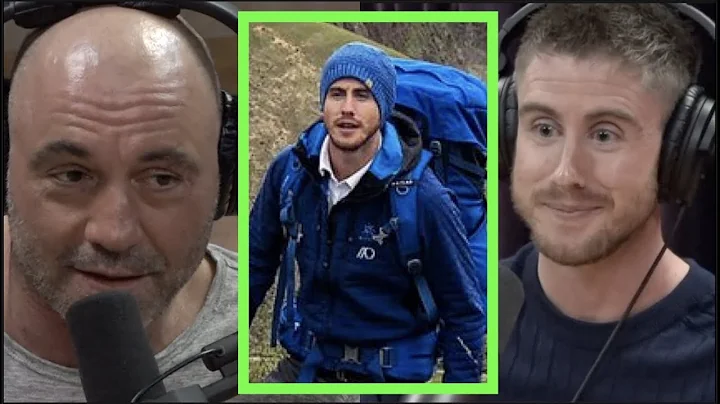Yangtze Daily reporter Li Xu

"Challenging the Impossible: Ten Years of Extraordinary Adventures" written by Ash Dyke and translated by Wang Chen and published by Shanghai Sanlian Bookstore
This week, Ash Dyke, a British explorer and extreme athlete who hiked the Yangtze River Ash Dykes went all the way to Wuhan.
On August 26 last year, his hiking trip to the Yangtze River officially started. He started from dangqu, Qinghai, the source of the Yangtze River at an altitude of 5,100 meters, and would go all the way to the estuary of the Yangtze River at an altitude of 0 meters. If this challenge is successful, he will become the first person to walk the entire Yangtze River and will also break the Guinness World Record.
He gave himself a Chinese name: Xiao Dai.
Xiao Dai is a post-90s generation.
Speaking of which, Xiao Dai can be considered a post-90s generation. He was born in 1990 with an ordinary family; but he has achieved many extraordinary achievements - in 2014, he was the first explorer to cross Mongolia on foot without support or supplies; in 2016, he became the first person to cross Mongolia on foot An adventurer from Madagascar; twice invited to the British Prime Minister's Office, he was hailed as "the world's bravest outdoor adventurer" by FHM magazine and won the title of British Explorer of the Year in 2015.
Reporters are actually a little biased against people who engage in outdoor sports, and always feel that they are "unreliable". But after reading Xiao Dai's autobiography "Challenging the Impossible", I found that he has many advantages: planning, self-discipline, and humility towards different cultures.
He has loved fitness, outdoor activities, and the rush of adrenaline since he was a child. He always sits on the roller coaster at the amusement park and refuses to get off. He has also been to the Arctic Circle with his family. Although his parents respected his hobbies, they asked him to continue his education after graduating from high school, so he took a two-year outdoor education course, including rock climbing, mountaineering, avalanche prevention, canoeing, etc., and obtained a national diploma.
He used to be a "cool" person. He bought a car and used half of his income to modify it. But when he made it clear that his wish was to travel around the world and explore, he immediately made a strict plan to save money, sold his car, and went to work according to the rules. Although he didn't like the job, he still worked hard overtime.
He made like-minded friends, and they discussed plans together, such as what to do if they ran out of money abroad. The following plan reporter found interesting and practical:
"I proposed that if the money runs out, we can work abroad without having to pack up and go home immediately. At first we considered becoming ski instructors, but that would have to cost a fortune first. Money is the only thing, so we turned to consider becoming scuba diving instructors. Since 75% of the world is water, and the largest population in the world lives on the coast, then as long as we learn to scuba dive, we can travel "
Xiao Dai has a high EQ and IQ.
Xiao Dai and his friends got their diving instructor qualifications and came to Beijing, China as their first stop. With a smile on his face, he ate stuff that Westerners wouldn't dare to eat at the night market, and it felt good.
From Beijing to Shanghai, the two of them sat on the train for 30 hours in order to save money. The "seat" was actually the aisle between the toilet and the trash can. The stench was so overwhelming that Xiao Dai couldn't sleep and talked with the passengers around him.
went to Thailand via Hong Kong. The two bought bicycles and rode through Cambodia to Vietnam . They later went to Pakistan and India, and encountered a military helicopter on the Kashmir glacier. In the Ganges, he saw feces, dead bodies, and industrial waste floating in the river. He realized that this was the most polluted river, but he still decided to try bathing in the Ganges like the locals. He covered his nostrils, ears, mouth and eyes, dove into the river, then came out, joking and running to the bathroom.
They were working part-time in Australia, and one day their boss took them door-to-door sales. The boss rubbed his fingers in front of the customer, made the gesture that represented cash, and boasted about how he had the means and how to make money. Xiao Dai felt embarrassed and quit his job.
Xiao Dai later returned to Thailand and worked as a diving coach for a while, with the purpose of learning Muay Thai, so that he could compete in competitions.
These were his preludes. After returning to the UK, he began to consider the real goal of the expedition - to hike alone across Mongolia, which no one had ever done before.
What preparations has he made for this? He found a travel agency in Mongolia to provide logistical support; applied unsuccessfully for National Geographic funding; worked with his family to plan a route; promoted himself to secure sponsorships; continued to exercise; and had a custom-made mild steel trailer outfitted with puncture protection. Tires; traveling through Wales, climbing the Alps , and driving around England as a drill and warm-up; preparing ration packs, stoves and other equipment; learning Mongolian culture - do not step on the threshold of the yurt; the hedgehog skins hung on the door frame of the yurt are used to prevent evil spirits When entering, do not knock; you can only walk around the two poles in the center of the yurt; you should cross your legs or pull your legs in when sitting down, and how to call "Genghis Khan" like Mongolians .
's successful journey through Mongolia brought Ashe more attention and more opportunities. A year later, Ash spent more than five months conquering the eight peaks of Madagascar from south to north. In fact, not long after the trip began, he contracted malaria and almost died. Fortunately, he received appropriate treatment. After resting, he continued to take medication while climbing Mount Burpee, the second highest mountain in Madagascar. It was really crazy, but he was having fun doing it.
The life of an explorer is not all about the bright moments. There are many wanderings, hardships and dangers. In "Challenging the Impossible", Ashe recorded various experiences during his adventures. In addition to facing physical limits, people's psychology is also being tested. Ash will also encounter moments of depression during the expedition, but he knows that this mood will eventually pass. He uses self-discipline to ensure that he can still stick to his goals when he is in a bad mood.
What the reporter is interested in is, how to develop an explorer? Exploration is one of the powerful secrets of the West. It has been integrated into the blood of Westerners, and they have a mature social support system for exploration. This determines that Chinese people need to make more preparations and pay more if they want to explore or go outdoors. price.
In fact, if you behave like Xiao Dai, even if you do something else instead of exploring, you will be closer to success.
[Interview] Hiking the Yangtze River, I made money
Reporter: Why did you choose the goal of "walking the entire Yangtze River"?
Xiaodai: When I first came to China in 2010, I knew I wanted to come here again and do "crazy" things in the heart of China. The Yangtze River is one of the major rivers in the world, ranking third in length in the world, and is the longest river in the world that only flows through one country. The Chinese land it flows through presents a different look. I will see the beautiful scenery, landforms, wild animals, customs and customs...these real wonders of China. In fact, no one had ever done this before, and I really paid off. Reporter
: Can you tell us the specific details? You have a very careful plan before each action. What preparations did you make for this walk on the Yangtze River?
Xiaodai: This is a 4,000-mile mission that will take about a year to complete. I hired different guides on different sections of the trail. I will face all extreme conditions, from sub-zero temperatures to scorching heat, humidity and rain. You will also encounter dangers such as bears, wolves, poisons, blizzards, landslides, loneliness, altitude sickness, etc. In terms of physical and mental fitness, I have been doing hard training. I train for about two hours every day, pay attention to healthy eating, and put myself in uncomfortable conditions in the wild to make myself more resistant to hardship. Reporter
: Is it safer or more comfortable this time than in Mongolia and Madagascar? What do you think is the biggest difficulty of this trip?
Xiaodai: This expedition is the most difficult in terms of altitude, weather, terrain and time span. It’s the longest trip I’ve ever taken, and a whole year is a long time to be out on an adventure. It was twice as long as my previous trips.





















